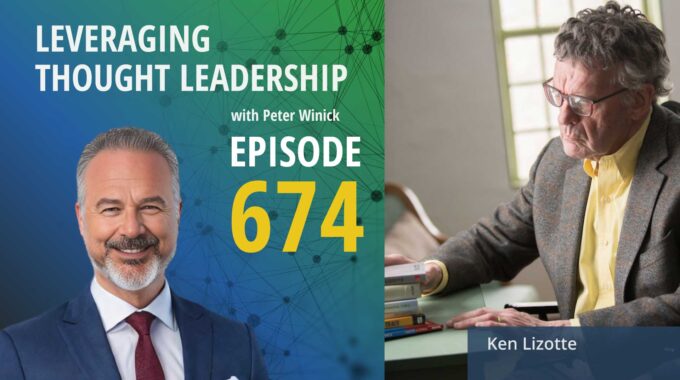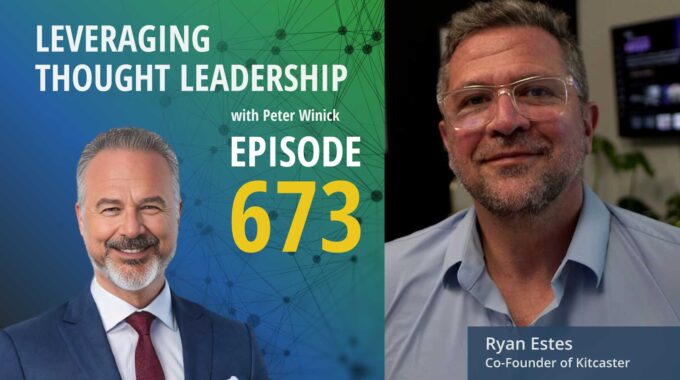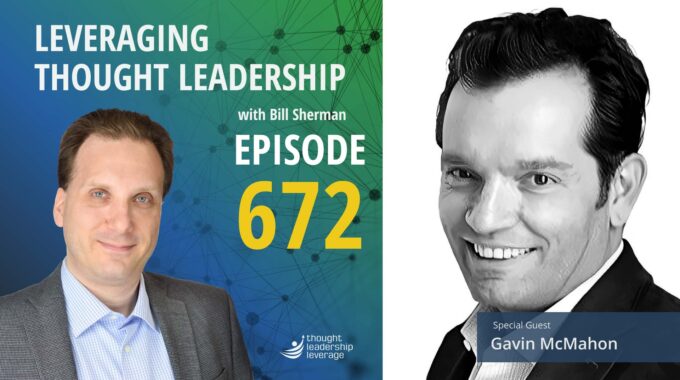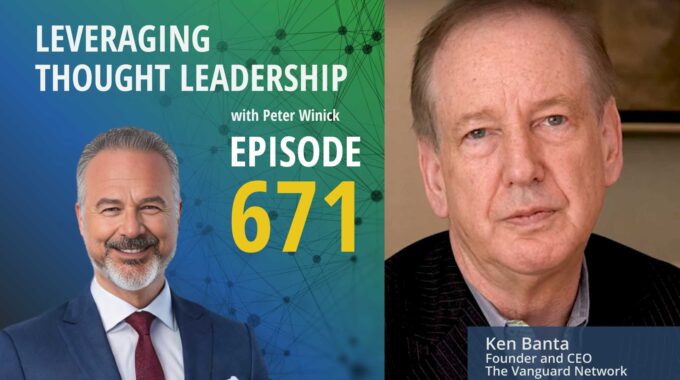Why Great Thought Leaders Don’t Play the Publisher’s Game Peter talks with publishing expert Ken…
Advice for Marketing, Messaging, and Publishing Your Thought Leadership Book | Aurora Winter
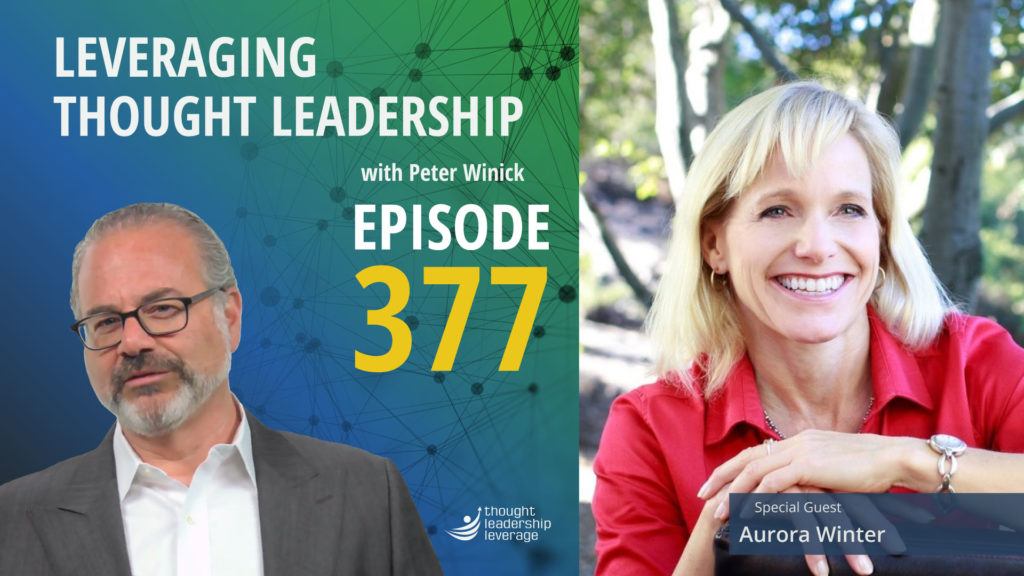
How to take a book from idea to bookstore shelf faster and better.
An interview with Aurora Winter about solving first time author problems and creating a business from a book.
Most authors spend, on average, three and a half years from the time they decide they want to write a book until the time the book hits store shelves. That is a massive investment of time that thought leaders and executives could be using to increase other revenue streams. What if you could speed the process up, without sacrificing quality?
Today’s guest, Aurora Winter, has a method for doing exactly that. Aurora is the Founder of Same Page Publishing and creator of the Spoke Author Method. Both help authors get their ideas on the page faster and on track to having a final product they can be proud of that will impact the lives of others and the author’s business. Aurora is also the best-selling author of Turn Words Into Wealth: Blueprint for Your Business, Brand, and Book to Create Multiple Streams of Income & Impact (Turn Your Words Into Wealth).
Having started as a television writer and producer, she grew frustrated with the financial restraints and turned to books. As a first-time author, Aurora faced many problems. However, in solving those problems, she found a passion for helping other authors, too. Today, Aurora shares some of the common hardships authors face, and gives suggestions to help those problems be overcome.
Many authors forget they will have to promote the book themselves. While the publisher is a partner, they will publish the book and then quickly move on to the next book in their lineup. We discuss with Aurora the pros and cons of traditional vs self-publishing, why you need a clear business goal for your book, and how you should be looking at your book as a long term legacy piece.
As we wrap up, Aurora gives us the perfect example of how a solid business plan can create more revenue than book sales. She gave her book Marketing Fastrack: The Little Book That Launched A New Business: $250,000 in 90 Days (which you can download for free) away to interested readers for just the price of shipping. She followed that book with a video series, and offered “business breakthrough” sessions. After 90 days, Aurora had generated $250,000 in sales from a book she was literally giving away.
If you want to better understand how your book can amortize over the years and gain a huge ROI, you’ll want to listen to this episode!
Three Key Takeaways:
- Thought Leaders don’t have to be constantly at the keyboard. Many successful books are dictated to a team who can shape those ideas into magic.
- Once your thought leadership book is done, the real work starts. You have to put in a lot of effort to promote your book, as the publisher will only do so for a relatively short period of time.
- A book is a mass-market product, but you must have a solid strategy if you want to use that book to increase your thought leadership business.
If you need a strategy to bring your thought leadership to market, Thought Leadership Leverage can assist you! Contact us for more information. In addition, we can help you implement marketing, research, and sales. Let us help you so you can devote yourself to what you do best.
Transcript
Peter Winick And welcome, welcome, welcome, this is Peter Winick, I’m the founder and CEO of Thought Leadership Leverage, and you’re joining us on the podcast, which is Leveraging Thought Leadership today. My guest is Aurora Winter. I’ll give you a quick bio. She’s an award winning bestselling author. She’s got a couple of books. Two of them are Turn Words Into Wealth, and then Marketing Fast Track. She’s an entrepreneur, she’s a media trainer, and she create the spoken author method. And she’s also the founder of Same Page Publishing. Her books have won several awards. I’m skimming through the last year. She’s been on many podcast and on such stations as ABC, CBS and many others. And let’s just instead of talking about her, let’s talk with her. So welcome.
Aurora Winter Great to be here with you, Peter.
Peter Winick Yeah. So let’s dive in. So first off. How does how did you know if I were to find you 10 or 15 or 20 years ago and say, where are you going to be today? This would have you would have accurately predicted exactly how all this played out, I assure you.
Aurora Winter All right. No, not so much.
Peter Winick Not so much. Okay. So we’re done with it.
Aurora Winter I love strategy, but I seem like in my own life, although later it seems, Oh, that makes sense. But I used to be in film and television. So was a TV writer/producer, and I got frustrated by not being able to create my own movies without raising several million dollars. So when that happens, I hate when that happens. So that led me back to books, and then I ran into the typical problems first time authors have with books. And then when I solve those problems for myself, then I wanted to help other people not suffer for three and a half years writing books when they can do it faster and get the word out better.
Peter Winick OK, so given the limited time amount we have because we can talk through this one topic for hours, what might some of the problems that first times authors face be that you’ve solved because there’s that is a very, very, very long list, but give us sort of a highlight reel. Let’s play with that a little bit.
Aurora Winter That’s a long list, and I know that, you know a lot about that for the benefit of the listeners. Most first-time authors spend three and a half years writing a book. Most people -.
Peter Winick I didn’t know that it’s a three and a half years from. I’m going to write a book, till throw it on the desk. Ouch.
Aurora Winter That’s throw it on the desk and sometimes throw it in the trash bin. But anyway,
Peter Winick Right? Right. Yeah.
Aurora Winter And then most people believe the myth that they need to be the person at the at the keyboard or at the typewriter. And that’s why I created the spoken author method. Most experts or leaders or would be thought leaders have something to say very can easily share stories. They can share their expertise. They can answer those questions that everybody’s asking them about whatever their area of expertise is. But most people freeze up when they face a blank page.
Peter Winick So, so, stay there for a minute because I mean, and I won’t name the name, but it was. It was a funny story where someone asked a client of mine who’s a multiple New York Times bestseller, or what are books do you read? And he answered, Quite honestly, I haven’t even read my book.
Aurora Winter I know who you’re thinking of.
Peter Winick Well, we’ll compare notes later, but maybe there’s more than one. And I think and what’s funny, maybe not funny about that is having the desire and the passion in something to say and the want or need to put it in a book is one thing being, you know, a master of prose and all those other things that it takes to take fuzzy ideas, battlement rattling around in your head and put them into something, you know, readable, digestible, etc. That’s not an easy that’s usually not the same skill set.
Aurora Winter Most people would collapse those two things, but that’s not how it was done. I mean, royalties, celebrities business tycoon Sir Winston Churchill. Do you think that they actually wrote every word? No, they dictated it to secretaries or researchers or assistants. And while it was Winston Churchill’s ideas, wasn’t him doing all the word wrangling and the same with the books, you know, from famous celebrities or politicians. But now, thanks to the wonders of the internet, every day, regular people can benefit from being interviewed and having a team around the world who can, who can shape their thoughts and their ideas into something useful. I mean, Sir Richard Branson, he’s dyslexic. He hates writing, and he’s written a whole bunch of New York Times bestselling books, and he’s very, very dedicated. He mentions his ghostwriter in the dedication and is very grateful to him. So I want to be –
Peter Winick Part of it. Yeah, right. This is what traditionally prevented absolute garbage from being in the universe was access cost and publishers, right? So publishers, if they serve no other purpose to be deterred. Right? You know, it was a filtering mechanism, right? So, you know, let’s say Richard Branson was dyslexic and decided he’s going to write on his own and it wasn’t a coherent sentence. They weren’t going to put that out there. And then part of the downside, and there’s plenty of far more upside and downside of self-publishing and all these tools is anybody in their mother could be a published author, and many times they are. And there was no, at least in the early wave of this quality control. So my opinion, whether you self-published hybrid public traditional, there’s absolutely, unequivocally no excuse for poor grammar typos, things that look like they were typeset by, you know, a drunken elf. And that’s the kind of crap that is just unacceptable. My humbling.
Aurora Winter But that’s – just hire an editor. Hire a book cover designer, hire a layout designer. I mean, if we are looking to publishers that the only thing that they do is gate. Keepers. I mean, that’s a stupid use of giving away just kind of the profits. That makes no sense. That’s not a good business.
Peter Winick Oh, I hear you. Yeah. Well, let’s see on this, on this, on this path of them because I spend a lot of my time educating. You know, clients that haven’t published yet. You know, and I feel sometimes like telling a kid there’s no Easter Bunny or Christmas, I feel like the bad guy, right? It’s like, Oh, you know, their view of the world is, you know, I’m me, and then I’m going to get an agent and the agents are going to get me a deal. And then rainbows and unicorns like, Okay, let me sit down here. Let me tell you how this works, right? So give me you some more myths that they struggle with or real things they struggle with telling.
Aurora Winter Well, you hit on another myth, which is that OK, once the book is done, you’re done. Sorry, sorry. That’s only 10 percent of it. I remember when my first book was published, From Heartbreak to Happiness. So happy Dr. Wayne Dyer, who’s my hero, endorsed the book and it was beautiful hardcover book and I slaved over it, agonized over every comma and then somebody told me, Oh yeah, OK, now the hard work begins. Now you have to market. But then, like, I thought it was done. Hard work? No. So I mean, my company, Same Page Publishing. We’re just a small boutique firm and we focus on award winning bestselling books. So it’s we like to help people who want the velvet glove treatment. You know, every step of the way and one hand-holding all through the process of getting their book to be an award-winning book and a bestselling book, and having it launched their business or their career or their speaking platform to the new life.
Peter Winick Yeah, I like the way you did that sequentially, is that award winning and then bestseller because a lot of people, what do you want to be? I want to be a New York Times bestseller. OK, well, here’s the algorithm, and here’s what that looks like if you can tell ten thousand seven hundred eighty-two bugs or whatever the number is that we want. Congratulations your new bestseller, but they’re not focused on. I want to produce, you know, I rarely hear, and they really don’t hear enough. I want to produce a book. I’m really going to be proud of. I want to produce a book that’s going to make it, you know, it’s somebody else’s measure of success. It’s like, you know, I want to be five percent richer than my neighbor. Like, OK, that’s sort of a stupid metric. Yeah, exactly.
Aurora Winter Your ego: a recipe for misery. A book is such a legacy piece. You know, the book can easily, you know, survive after I’m gone, after the author is gone and you want to be proud of it. I mean, it’s a lifetime achievement. It’s like having a Ph.D. or having in my case, it’s a it’s something to be proud of. It’s an achievement. It’s an accomplishment. And what is it? People just had a podcast interview with a woman who she said I thought I wanted the New York Times bestselling book can tell. Speaking to you now, I realize, no, I want the book to be really great. And also that’s –
Peter Winick And I think I think the other side of that is, or maybe it’s related to that is the book industrial complex, if you will, right? The publishers, the publishers, whatever that whole universe really are short term thinkers. And I’m not making that sort of judgment. It’s just the cadence of the business. They have their fall catalog, they have the spring catalog, whatever. And I think what too many authors fail to understand far too often is, listen, you’re going to go through this phase with the publisher. Read the most important person in the world for a really, really short period of time. And then you’re kind of irrelevant and don’t take it personally. It is your book and you should be thinking of your book as if it was an investment because it is right of your time of your money, you know, the opportunity, cost, etc. and trying to amortize that investment over a five to seven year schedule at a minimum. Because to me, the classic example you know, the proof of a great book is how to pick a book off my shelf. It might be 30 years old and might be not out yet. It might be two years old. Nobody but an author or a lunatic in publishing goes back to the pub date. It’s a ridiculous date. It’s like, this is a good book that stood the test of time. Maybe not for 50 years, right? Maybe five years. That’s OK.
Aurora Winter Yeah, it’s an asset. A book is a piece of intellectual property. It’s an asset, and you’re right, people need to amortize it. And our society is like, we live in a microwave society. Everybody wants instant. But honestly, microwaving your dinner is not going to produce the same results as if you cook it the ideal way. And it’s the same with the book. I don’t think fast should be the ideal outcome or like in my book, Turn Words Into Wealth, I shared, you know, seven different business models that have been proven to monetize books. And none of those seven is a New York Times bestseller, because that is very expensive to do if you’re starting from nothing. But there’s different business models. I can monetize a book over time. If they’re if you’re a business owner or a thought leader, have something for the author.
Peter Winick If you’re enjoying this episode of Leveraging Thought Leadership, please make sure to subscribe. If you’d like to help spread the word about our podcast, please leave us a review and share it with your friends. We’re available on Apple Podcasts and on all major listening apps, as well as at Thought Leadership Leverage dot com forward slash podcasts.
Peter Winick So one of the things that I try to sort of how would I put it unfuzzy for people is, you know, a book by its very definition, is a mass market product. It’s a 20, $25 product that you want to sell thousands or tens of thousands or hundreds of thousands. Great. It’s kind of no different than soap or toilet paper per perfume. The reality is, what are you really trying to achieve with your book? Let’s think about the goal. So if you’re a consultant and you landed a handful of high six or low seven figure clients over the course of two or three years, that would be that would be your version of a New York Times bestseller. And I think oftentimes we’re falling for other people’s versions, right? So if that’s the case of I’m a consultant and a good engagement for me is a half a million bucks, I’d like to pick up five clients over three years. Whatever the whatever, that map is great, then that’s hand-to-hand combat. So who are the 500 people, 300 people, 200 people that if I got the book in their hands, could change my game and start to think of it that way. Very bespoke, very one on one than these mass marketing tactics.
Aurora Winter I love the way you talk about that, but very clearly nice, really nice soundbites. David Goggins he decided to self-publish his book, as I’m sure that, you know, he said the worst advice he ever got was by New York publisher – no, sorry, New York agent – who said that if you self-published, the most number of copies you would sell would be five thousand. But David Goggins decided to self-publish anyway or “independent publish,” as we call it, because he didn’t want to lose control of his story. And he went on, as you probably know, to sell a million copies.
Peter Winick Yup, yup.
Aurora Winter – And 600000 copies of the audio book by promoting it himself. But most people don’t realize they’re going to have to promote their book themselves anyway, so we’re going to have to promote it anyway. Why not keep the bulk of the revenue and keep control? If he had gone.
Peter Winick And I hope he’s sending that, that Agent book scan numbers every quarter just half again.
Aurora Winter If he had gone with a big publisher, it probably would have cost him in the order of magnitude of 10 to 20 million dollars. But you’re right.
Peter Winick OK, so unpack that, though. So this is the other piece that people don’t understand is part of the decision to publish sell hybrid traditional is a business decision. Full stop. So if the publisher is looking at you to be the sales vehicle because you’re a speaker, you have a following or whatever it is, then you go, Okay, great. So I’m writing the book and I’m selling the book. So this was a partnership. What are they bringing to the table? Wait, and they get 80 or 90 cents on the dollar? That doesn’t feel right. Like just intuitively to a 10 year old. If you said, we’re both going to make this peanut butter and jelly sandwich and you get the crust and I get the rest of it. How does that feel to you, the seven year old Peter Winick, but that doesn’t feel nice.
Aurora Winter Exactly right.
Peter Winick We know this intuitively, and now we’re seeing things. I call them the worst of both worlds where you get a book contract from a big publisher that says, OK, well, you’re not going to get an advance. No authors, by the way, don’t. Well, confuse what is an advance means it’s an advance against future earnings. It is not a, “I’m going to give you this money because I think you’re so charming, Aurora.” it is a bet against the future earnings growth, right? So it’s really about cash flow. So not only do the publishers say you’re not going to get an advance. OK, that’s fine. I’ll make it up later. That’s all cool. And. But you only have to buy, you know, 3000 books a year for two years at wholesale. So then you do the math. I got me and say so all the economic risk is on me as well. And then if this thing goes, well, you’re my partner at 80 cents on the dollar, like, you know –
Aurora Winter And, part of that makes sense. How badly you need to feel your feed, your ego?
Peter Winick It’s like a bad mob movie, right? I think it’s just doesn’t, you know, whatever. So but I think people sometimes don’t use business math or just basic business logic and reason and say, Is this a business deal that goes like, like a logical deal for you? Are they making any guarantees? Probably. But are they putting their best and brightest on it? Your first time off and you can get a 23 year old that just graduated Smith or Vassar?
Aurora Winter Yeah, yeah. Well, I’m a big believer in self-publishing or independent publishing, but I’m a diehard entrepreneur. I like to have control of my lead magnets. So, but I liked what you said a few minutes ago when you were talking about, you know, somebody, let’s talk about their specific business plan and be more bespoke. So my business plan, like my books, are mass market books that will help a lot of people. I hope that they help a lot of people and I don’t withhold anything in my books so people can actually get the book marketing fast. Track the little book that launched a new business which generated two hundred and fifty thousand dollars of new business in 90 days. They can get the e-book for free wherever they like to get books. Amazon, Kobo, Apple.
Peter Winick By the way, let’s pull that sound byte is the ultimate excellent way to throw the plug. Well done.
Aurora Winter Very well. Thanks, Peter. And in my book, because
Peter Winick I’m joking about that, but like far too many people are on a guest on a podcast and we’re not. I mean, this isn’t plug around like here. But why wouldn’t you mention like, I can’t tell you how many guests are like, OK? And go find me on Amazon. Find you. I’m too busy. Tell me exactly where it is and what it is and why. And like, give me something to remember. So I’m pointing it out sort of jokingly, but I think it actually is a case study in a nice way to do that in our high level with
Aurora Winter Thanks, Peter. Well, you know, and it’s a great gift. It’s absolutely free. I took my MBA. I took two years off my business. I just came back from Italy. This was in 2015, and I’m like, OK, now what? I have to either start a business again or I have to get a job. Nah, let’s not do that.
Peter Winick Right, right.
Aurora Winter Like I, I just had a small email list at that time at 12000 people and I thought people knew me as a coach trainer. Sure. And I thought, well, maybe people would be interested in having my help with their marketing, messaging and publishing their books. So I used a one hour interview, which I transcribed. So it was the spoken author method, but in brief and turned that into a little book to use as a minimum viable product or an MVP, most valuable player and see if people would be interested in having my help with their marketing, their messaging and publishing their book. And that little book, when I sent it out to my email list, they just paid shipping and handling. Then they got five videos that added more value than they were offered a business breakthrough session and that generated two hundred and fifty thousand dollars of new business in 90 days, not from book sales. The book was a gift.
Peter Winick No, and whether you – well, and even if it’s great whether you sold 30 or 3000 net that you spent x you generated X number of net new. It’s a client acquisition cost, right? And, you know, as long as the math works on that 250 that you acquired, that those gross dollars cost effectively, which it sounds like you did. That’s a winner. But that’s not the stuff that people love to sort of brag about. That doesn’t sound. I mean, I’d rather hear that story because that’s a lot more than, Oh, and I’m an Amazon bestseller, which is like saying, Oh, so you paid someone, you know, whatever a thousand dollars you take a screenshot like, that’s good for you. Good luck.
Aurora Winter If memory serves me, I spent about $12,000 in Google and Facebook ads, so it was a very good return on investment.
Peter Winick Is that to outweigh what’s? Yes, it’s about 20 x, right? So you have a five percent…
Aurora Winter – thousand dollars in –
Peter Winick and 120, 240, for it. Yeah, right.
Aurora Winter Yeah. Oh, OK.
Aurora Winter That’s good math.
Aurora Winter That’s good math. So my book Turn Words Into Wealth, which is the book that just came out, 80 percent of people want to write a book. So a lot of people will find that very useful. But only a small trickle of those people will be people who can afford to invest in having it done for them having it. Sure, of course, right? And that’s my business model. I’m happy to. That’s OK. Yeah, it’s more than OK. It’s unrealistic.
Peter Winick Oh, well, on that note, this has been fun. Thank you so much for sharing your journey, your story, your insights. Let us in behind the curtain a little bit. Appreciate it. Thank you so much.
Aurora Winter My pleasure.
Aurora Winter To learn more about Thought Leadership Leverage, please visit our web site at ThoughtLeadershipLeverage.com to reach me directly. Feel free to email me at Peter at ThoughtLeadershipLeverage.com and please subscribe to Leveraging Thought Leadership on iTunes or your favorite podcast app to get your weekly episode automatically.



